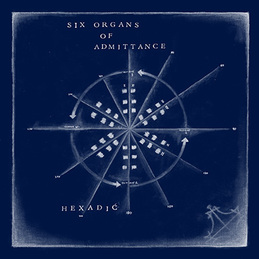In the years since Ben Chasny’s 1998 self-titled debut as Six Organs Of Admittance – released in an initial pressing of just 400 copies, hand-painted and hand-stamped by Chasny himself – the California native has established himself as something of a psych-folk icon. This is a result of both his prodigious output – well over a dozen records in 17 years – and the enduring eclecticism of his approach. The atmosphere is consistent: foggy, meditative, vaguely conspiratorial – but the musical details are always changing: harsh drones on 2002’s Dark Noontide, somber classical guitars on 2004’s For Octavio Paz, acid-drenched psych shredding on 2012’s Ascent (made with Chasny’s former band mates in Comets On Fire). While the freak-folk movement, which hailed Six Organs as a founding father, has largely come and gone, Chasny has continued to toil away in the dense swamp inhabited by Sunn O))), Harry Smith and art-house guitarists like Loren Connors.
Coming two full years after Ascent, Hexadic ends the longest drought in Six Organs’ recorded history. It also marks the biggest aesthetic break from Chasny’s past work. Hexadic employs a singular, chance-based method of musical composition called the "Hexadic System", developed by Chasny over the last couple years, to create the tonal, rhythmic and lyrical framework on which every track is based. Details on how the system actually works are in short supply (though apparently there’s a book forthcoming from Chasny’s Drag City label that will explain the whole thing). But suffice it to say that the system uses traditional playing cards to determine the particular set of six notes, called a "hexafield", that can be used for any composition, and that a similarly random, yet highly rule-bound process is involved in the creation of the lyrics.
The record’s press materials describe the system as "designed to free sound and language from rational order and replace calculation with indeterminacy." Point taken. And Chasny has said in recent interviews that he came up with the Hexadic System in part to re-energise his guitar playing and push it in new, uncomfortable directions.
The question, of course, is whether it makes for good records. Hexadic is certainly the most bracing, least accessible album Chasny has ever made as Six Organs Of Admittance. Imagine the Velvet Underground’s White Light/White Heat as a free jazz excursion – molten electric guitar solos splayed over clippity-clop percussion and lurching bass, with the occasional word or two ("fake!" "path!" "cut!" – it’s not entirely clear) barked over the mix. Six Organs is just a trio here, but the band makes an unholy racket. Chasny’s guitar sound is so blown-out and goopy with distortion that you could practically hold it in your hands.
<div class="fb-comments" data-href="http://thequietus.com/articles/17208-six-organs-of-admittance-hexadic” data-width="550">


